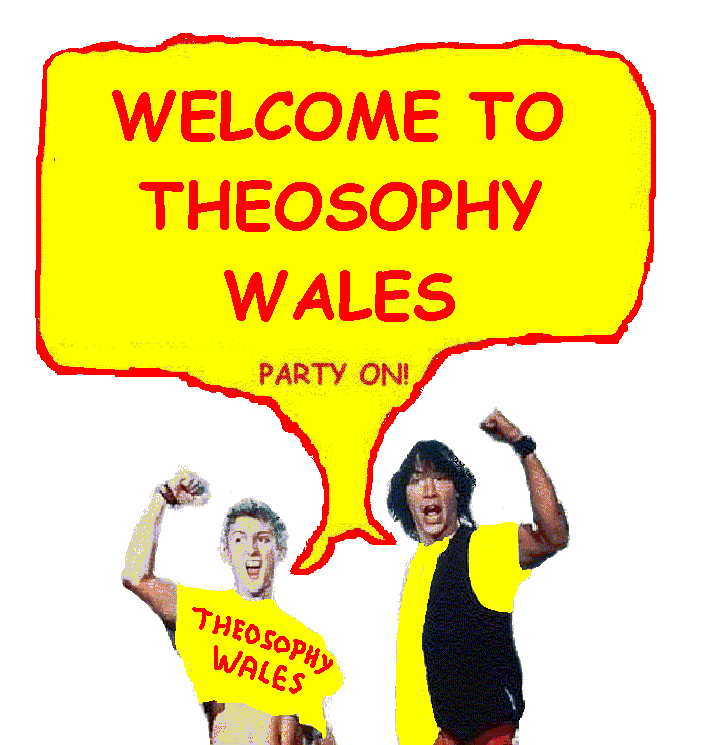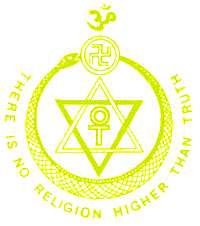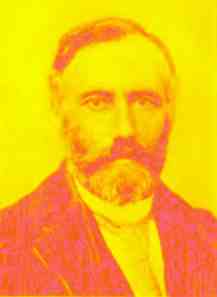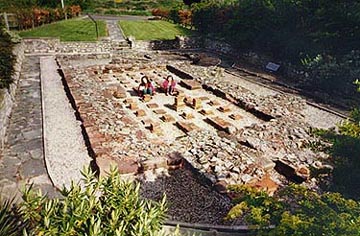

____________
THE
OF
THEOSOPHY

A Definitive Work on Theosophy
By
William Quan
Judge

CHAPTER 13
Devachan
Having shown that just beyond the threshold of human life there is a
place of separation wherein the better part of man is divided from his lower
and brute elements, we come to consider what is the state after death of the
real being, the immortal who travels from life to life. Struggling out of the
body the entire man goes into kama loka, to purgatory, where he again struggles and
loosens himself from the lower skandhas; this
period of birth over, the higher principles, Atma-Buddhi-Manas,
begin to think in a manner different from that which the body and brain
permitted in life. This is the state of Devachan, a Sanskrit word meaning
literally "the place of the gods," where the soul enjoys
felicity; but as the gods have no such bodies as ours, the Self in devachan is devoid of a mortal body. In the ancient books
it is said that this state lasts "for years of infinite number," or
"for a period proportionate to the merit of the being"; and when the
mental forces peculiar to the state are exhausted, "the being is drawn
down again to be reborn in the world of mortals."
Devachan
is therefore an interlude between births in the world. The law of karma which
forces us all to enter the world, being ceaseless in its operation and also
universal in scope, acts also on the being in devachan,
for only by the force or operation of Karma are we taken out of devachan. It is something like the
pressure of atmosphere which, being continuous and uniform, will push
out or crush that which is subjected to it unless there be a compensating
quantity of atmosphere to counteract the pressure. In the present case the
karma of the being is the atmosphere always pressing the being on or out from
state to state; the counteracting quantity of atmosphere is the force of the
being's own life-thoughts and aspirations which prevent his coming out of devachan until that force is exhausted, but which being
spent has no more power to hold back the decree of our self-made mortal destiny.
The necessity for this state after death is one of the necessities of
evolution growing out of the nature of mind and soul. The very nature of manas requires a devachanic state
as soon as the body is lost, and it is simply the effect of loosening the bonds
placed upon the mind by its physical and astral encasement.
In life we can but to a fractional extent act out the thoughts we have
each moment; and still less can we exhaust the psychic energies engendered by
each day's aspirations and dreams. The energy thus engendered is not lost or
annihilated, but is stored in Manas, but the body,
brain, and astral body permit no full development of the force. Hence, held
latent until death, it bursts then from the weakened bonds and plunges Manas, the thinker, into the expansion, use, and
development of the thought-force set up in life.
The impossibility of escaping this necessary state lies in man's
ignorance of his own powers and faculties. From this ignorance delusion arises,
and Manas not being wholly free is carried by its own
force into the thinking of devachan. But while
ignorance
is the cause for going into this state the whole process is remedial,
restful, and beneficial. For if the average man returned at once to another
body in the same civilization he had just quitted, his soul would be completely
tired out and deprived of the needed opportunity for the development of the
higher part of his nature.
Now the Ego being minus mortal body and kama,
clothes itself in devachan with a vesture which cannot
be called body but may be styled means or vehicle, and in that it functions in
the devachanic state entirely on the plane of mind
and soul. Everything is as real then to the being as this world seems to be to
us.
It simply now has gotten the opportunity to make its own world for
itself unhampered by the clogs of physical life. Its state may be compared to
that of the poet or artist who, rapt in ecstacy of
composition or arrangement of color, cares not for and knows not of either time
or objects of the world.
We are making causes every moment, and but two fields exist for the
manifestation in effect of those causes. These are, the objective as this world
is called, and the subjective which is both here and after we have left this
life. The objective field relates to earth life and the grosser part of man, to
his bodily acts and his brain thoughts, as also sometimes to his astral body.
The subjective has to do with his higher and spiritual parts. In the
objective field the psychic impulses cannot work out, nor can the high leanings
and aspirations of his soul; hence these must be the basis, cause, substratum,
and support for the state of devachan. What then is
the time, measured by mortal
years, that one will stay in devachan?
This question while dealing with what earth-men call time does not, of
course, touch the real meaning of time itself, that is, of what may be in fact
for this solar system the ultimate order, precedence, succession, and length of
moments.
It is a question which may be answered in respect to our time, but not
certainly in respect to the time on the planet Mercury, for instance, where
time is not the same as ours, nor, indeed, in respect to time as conceived by
the soul. As to the latter any man can see that after many years have slipped
away he has no
direct perception of the time just passed, but is able only to pick out
some of the incidents which marked its passage, and as to some poignant or
happy instants or hours he seems to feel them as but of yesterday. And thus it
is for the being in devachan. No time is there. The
soul has all the benefit of what goes on within itself in that state, but it
indulges in no speculations as to the lapse of moments; all is made up of
events, while all the time the solar orb is marking off the years for us on the
earth plane.
This cannot be regarded as an impossibility if we will remember how, as
is well known in life, events, pictures, thoughts, argument, introspective
feeling will all sweep over us in perfect detail in an instant, or, as is known
of those who have been drowning, the events of a whole life time pass in a
flash before the eye of the mind. But the Ego remains as said in devachan for a time exactly proportioned to the psychic
impulses generated during life. Now this being a matter which deals with the
mathematics of the soul, no one but a Master can tell what the time would be
for the average man of this century in every land. Hence we have to depend on
the Masters of wisdom for that average, as it must be based upon a calculation.
They have said, as is well put by Mr. A. P. Sinnett in his Esoteric
Buddhism, that the period is fifteen hundred years in general. From a reading
of his book, which was made up from letters from the Masters, it is to be
inferred he desires it to be understood that the devachanic
period is in each and every case fifteen centuries; but to do away with that
misapprehension his informants wrote at a later date that that is the average
period and not a fixed one.
Such must be the truth, for as we see that men differ in respect to the
periods of time they remain in any state of mind in life due to the varying
intensities of their thoughts, so it must be in
devachan where thought has a
greater force though always due to the being who had the thoughts.
What the Master did say on this is as follows: "The 'dream of devachan'
lasts until karma is satisfied in that direction. In devachan
there is a gradual exhaustion of force. The stay in devachan
is proportionate to the unexhausted psychic impulses originated in earth life.
Those whose actions were
preponderatingly material will be sooner brought back into
rebirth by the force of Tanha." Tanha is the thirst for life. He therefore who has not in
life originated many psychic impulses will have but little basis or force in
his essential nature to keep his higher principles in devachan.
About all he will have are those originated in childhood before he began
to fix his thoughts on materialistic thinking. The thirst for life expressed by
the word Tanha is the pulling or magnetic force
lodged in the skandhas inherent in all beings. In
such
a case as this the average rule does not apply, since the whole effect
either way is due to a balancing of forces and is the outcome of action and
reaction.
And this sort of materialistic thinker may emerge out of devachan
into another body here in a month, allowing for the unexpended psychic forces
originated in early life. But as every one of such persons varies as to class,
intensity and quantity of thought and psychic impulse, each may vary in respect
to the time of stay in devachan.
Desperately materialistic thinkers will remain in the devachanic
condition stupefied or asleep, as it were, as they have no forces in them
appropriate to that state save in a very vague fashion, and for them it can be
very truly said that there is no state after death so far as mind is
concerned; they are torpid for a while, and then they live again on
earth. This general average of the stay in devachan
gives us the length of a very important human cycle, the Cycle of
Reincarnation. For under that law national development will be found to repeat
itself, and the times that are past will be found to come again.
The last series of powerful and deeply imprinted thoughts are those
which give color and trend to the whole life in devachan.
The last moment will color each subsequent moment. On those the soul and mind
fix themselves and weave of them a whole set of events and experiences,
expanding them to their highest limit, carrying out all that was not possible
in life. Thus expanding and weaving these thoughts the entity has its youth and
growth and growing old, that is, the uprush of the
force, its expansion, and its dying down to final exhaustion.
If the person has led a colourless life the devachan will be colourless; if a
rich life, then it will be rich in variety and effect. Existence there is not a
dream save in a conventional sense, for it is a stage of the life of man, and
when we are there this present life is a dream. It is not in any sense
monotonous. We are too prone to measure all possible states of life and places
for experience by our present earthly one and to imagine it to be reality.
But the life of the soul is endless and not to be stopped for one
instant. Leaving our physical body is but a transition to another place or
plane for living in. But as the ethereal garments of devachan
are more lasting than those we wear here, the spiritual,
moral, and psychic causes use more time in expanding and exhausting in
that state than they do on earth. If the molecules that form the physical body
were not subject to the general chemical laws that govern physical earth, then
we should live as long in these bodies as we do in the devachanic
state. But such a
life of endless strain and suffering would be enough to blast the soul
compelled to undergo it. Pleasure would then be pain, and surfeit would end but
in an immortal insanity. Nature, always kind, leads us soon again into heaven
for a rest, for the flowering of the best and highest in our natures.
Devachan
is then neither meaningless nor useless. "In it we are rested; that part
of us which could not bloom under the chilling skies of earth-life bursts forth
into flower and goes back with us to earth-life stronger and more a part of our
nature than before. Why should we repine that Nature kindly aids us in the
interminable struggle, why keep the mind revolving about the present petty
personality and its good and evil fortunes? " (Letter from Mahatma K. H.
See Path p. 191, Vol. 5.)
But it is sometimes asked, what of those we have left behind: do we see
them there? We do not see them there in fact, but we make to ourselves their
images as full, complete, and objective as in life, and devoid of all that we
then thought was a blemish. We live with them and see them grow great and good
instead of mean or bad. The mother who has left a drunken son behind finds him
before her in devachan a sober, good man, and
likewise through all possible cases, parent, child, husband, and wife have
their loved ones there perfect and full of knowledge. This is for the benefit
of the soul. You may call it a delusion if you will, but the illusion is
necessary to happiness just as it often is in life. And as it is the mind that
makes the illusion, it is no cheat.
Certainly the idea of a heaven built over the verge of hell where you
must know, if any brains or memory are left to you under the modern orthodox
scheme, that your erring friends and relatives are suffering eternal torture,
will bear no comparison with the doctrine of devachan.
But entities in devachan are not
wholly devoid of power to help those left on earth. Love, the master of
life, if real, pure, and deep, will sometimes cause the happy Ego in devachan to affect those left on earth for their good, not
only in the moral field but also in that of material circumstance. This is
possible under a law of the occult universe
which cannot be explained now with profit, but the fact may be stated.
It has been given out before this by H. P. Blavatsky, without, however, much
attention being drawn to it.
The last question to consider is whether we here can reach those in devachan
or do they come here. We cannot reach them nor affect them unless we are
Adepts.
The claim of mediums to hold communion with the spirits of the dead is
baseless, and still less valid is the claim of ability to help those who have
gone to devachan.
The Mahatma, a being who has developed all his powers and is free from
illusion, can go into the devachanic state and then
communicate with the Egos there.
Such is one of their functions, and that is the only school of the Apostles
after death. They deal with certain entities in devachan
for the purpose of getting them out of the state so as to return to earth for
the benefit of the race. The Egos they thus deal with are those whose nature is
great and deep but who are not wise enough to be able to overcome the natural
illusions of devachan.
Sometimes also the hypersensitive and pure medium goes
into this state and then holds communication with the Egos there, but it
is rare, and certainly will not take place with the general run of mediums who
trade for money. But the soul never descends here to the medium. And the gulf
between the consciousness of devachan
and that of earth is so deep and wide that it is but seldom the medium can
remember upon returning to recollection here what or whom it met or saw or
heard in devachan. This gulf is similar to that which
separates devachan from rebirth; it is one in which
all memory of what preceded it is blotted out.
The whole period allotted by the soul's forces being ended in devachan,
the magnetic threads which bind it to earth begin to assert their power. The
Self wakes from the dream, it is borne swiftly off to a new body, and then,
just before birth, it sees for a moment all the causes that led it to devachan and back to the life it is about to begin, and
knowing it to be all just, to be the
result of its own past life, it repines not but takes up the cross again
-- and another soul has come back to earth.
______________________
THE
OF
THEOSOPHY

Find out more about
Theosophy with these links

The Cardiff Theosophical Society Website
The National
Wales Theosophy Website
Theosophy
Wales Youtube Channel
Ten Benefits of Studying the Blavatskyan
Theosophical Teachings
Studying
the Blavatskyan Theosophical teachings offers numerous benefits that can greatly
enrich one's understanding of spirituality, philosophy, and the nature of
reality.† Theosophy, as defined by the
writings of Helena Petrovna Blavatsky, has had a
profound impact on the spiritual and philosophical landscape of the modern
world. Blavatsky's teachings draw from a wide range of religious and
philosophical traditions, including Hinduism, Buddhism, and Western
esotericism, and present a comprehensive worldview that addresses fundamental
questions about existence, consciousness, and the cosmos.
Here
are ten benefits of studying the Blavatskyan Theosophical Teachings
1.
Exploration of Esoteric Wisdom
One
of the primary benefits of studying the Blavatskyan Theosophical teachings is
the opportunity to explore esoteric wisdom that is often not readily accessible
in mainstream religious or philosophical traditions. Blavatsky's writings delve
into the esoteric teachings of ancient cultures and mystery schools, shedding
light on profound spiritual truths that have been passed down through the ages.
By delving into these esoteric teachings, students of Theosophy can gain
insights into the nature of consciousness, the structure of the cosmos, and the
evolution of the soul or immortal self.
2.
Synthesis of Eastern and Western Philosophy
Blavatsky's
Theosophical teachings synthesize elements of Eastern and Western philosophy,
offering a comprehensive framework that integrates concepts from diverse
cultural and religious traditions. This synthesis provides students with a
broader perspective on philosophical and spiritual thought, allowing them to
see the underlying unity of seemingly disparate belief systems. By studying
Theosophy, individuals can gain a deeper appreciation for the universal
principles that underlie all wisdom traditions, fostering a sense of unity and
interconnectedness with the world's spiritual heritage.
3.
Understanding of Universal Brotherhood
Central
to Blavatsky's Theosophical teachings is the principle of universal
brotherhood, which emphasizes the essential unity of all beings and the
interconnectedness of life. By studying Theosophy, individuals can develop a
profound understanding of the interconnected nature of existence, recognizing
that all living beings are fundamentally linked and that compassion and empathy
are essential for the evolution of humanity. This understanding can lead to a
greater sense of empathy, kindness, and social responsibility, fostering a more
harmonious and compassionate society.
4.
Insight into the Nature of Reality
The
Blavatskyan Theosophical teachings offer profound insights into the nature of
reality, consciousness, and the unseen dimensions of existence. Through the
study of Theosophy, individuals can explore concepts such as the
multi-dimensional nature of the universe, the existence of subtle energy
realms, and the interconnectedness of the material and spiritual planes. This
exploration can lead to a deeper understanding of the nature of reality beyond
the limitations of the physical senses, opening up new vistas of perception and
understanding.
5.
Personal Spiritual Growth
Studying
the Theosophical teachings can be a transformative journey that facilitates
personal spiritual growth and self-discovery. Blavatsky's writings offer
practical guidance for inner development, including meditation practices,
ethical principles, and the cultivation of spiritual virtues. By applying these
teachings to their lives, individuals can experience profound personal
transformation, leading to greater self-awareness, inner peace, and a sense of
purpose and meaning.
6.
Ethical and Moral Guidance
The
Theosophical teachings provide a comprehensive ethical and moral framework that
can guide individuals in their personal and social interactions. Blavatsky
emphasizes the importance of ethical conduct, altruism, and the pursuit of
wisdom, offering practical guidance for leading a virtuous and meaningful life.
By studying Theosophy, individuals can gain clarity on moral issues, cultivate
a sense of ethical responsibility, and contribute to the greater good of
humanity.
7.
Appreciation of Comparative Religion
The
study of Theosophy encourages an appreciation of comparative religion and the
underlying unity of religious and spiritual traditions. Blavatsky's writings
explore the common threads that run through the world's religions, highlighting
universal spiritual principles that transcend cultural and historical
boundaries. By gaining a deeper understanding of comparative religion through
Theosophy, individuals can develop a more inclusive and pluralistic
perspective, fostering interfaith harmony and mutual respect.
8.
Intellectual Stimulation
The
Theosophical teachings offer a rich and intellectually stimulating framework
for exploring profound philosophical and metaphysical concepts. Blavatsky's
writings encompass a wide range of subjects, including cosmology, metaphysics,
ancient wisdom, and the evolution of consciousness, providing ample material
for intellectual inquiry and contemplation. By engaging with these teachings,
individuals can expand their intellectual horizons, develop critical thinking
skills, and gain a deeper understanding of the fundamental questions that have
intrigued philosophers and mystics throughout history.
9.
Healing and Reconciliation
The
Theosophical teachings offer insights into the nature of healing and
reconciliation, both on a personal and collective level. Blavatsky's writings
delve into the esoteric principles of healing, the nature of disease, and the
interconnectedness of mind, body, and spirit. By studying Theosophy,
individuals can gain a deeper understanding of holistic healing modalities, the
power of the mind in influencing health, and the potential for spiritual
transformation through the healing process. Furthermore, the Theosophical
emphasis on universal brotherhood and compassion can contribute to the
reconciliation of divisions and conflicts within society, fostering a more
harmonious and peaceful world.
10.
Contribution to Global Transformation
Finally,
studying the Blavatskyan Theosophical teachings can empower individuals to
contribute to the ongoing global transformation towards a more enlightened and
compassionate world. Blavatsky's vision of a spiritually awakened humanity,
working towards the betterment of all beings, inspires individuals to engage in
positive action and service to humanity. By embodying the principles of
Theosophy in their lives, individuals can become agents of positive change,
working towards the realization of a more just, peaceful, and sustainable world.
In
summary, the study of the Blavatskyan Theosophical teachings offers a wide
range of benefits, ranging from personal spiritual growth to the potential for
global transformation. By delving into the esoteric wisdom, ethical principles,
and philosophical insights of Theosophy, individuals can expand their
understanding of the nature of reality, cultivate compassion and empathy, and
contribute to the evolution of humanity towards a more harmonious and
enlightened future. As the Theosophical teachings continue to inspire and guide
seekers of truth and wisdom, their profound impact on individuals and society
is likely to endure for generations to come.
If you run a Theosophy Group,
please feel free
to
use any of the material on this site
The Most Basic Theosophy
†Website in the Universe
A quick overview of Theosophy†
and the Theosophical Society
If you run a Theosophy Group you†
can use this as an introductory handout.
Theosophy Cardiffís Instant Guide
One liners and quick explanations
H P Blavatsky is
usually the only
Theosophist that
most people have ever
heard of. Letís put
that right
The Voice of the Silence Website
An Independent Theosophical Republic
Links to Free Online Theosophy†
Study Resources; Courses, Writings,†
The main criteria
for the inclusion of
links on this site is
that they have some
relationship (however
tenuous) to Theosophy
and are lightweight,
amusing or entertaining.
Topics include
Quantum Theory and Socks,
Dick Dastardly and Legendary Blues Singers.
A selection of articles
on Reincarnation
Provided in
response to the large†
number of enquiries we
receive at†
Cardiff
Theosophical Society on this subject
The Voice of the Silence Website
This is for everyone, you donít have to live
in
Wales to make good use of this Website
Llanidan
Old Church, Brynsiencyn, Anglesey, North Wales.
The 14th Century
church was abandoned in 1844
Llanidan Church, Brynsiencyn, Anglesey, North Wales.
No Aardvarks were harmed in the
The Spiritual Home of Urban Theosophy
The Earth Base for Evolutionary Theosophy
A B C D EFG H IJ KL M N OP QR S T UV WXYZ
Complete Theosophical Glossary in Plain Text Format
1.22MB
Quick Explanations with Links to
More Detailed Info
What is Theosophy ? Theosophy Defined (More Detail)
Three Fundamental Propositions† Key Concepts of Theosophy
Cosmogenesis† Anthropogenesis†
Root Races†
Karma
Ascended Masters† After Death States†
Reincarnation
The Seven Principles of Man† Helena Petrovna Blavatsky
Colonel Henry Steel Olcott William Quan Judge
The Start of the Theosophical Society
History of the Theosophical Society
Theosophical Society Presidents
History of the Theosophical Society in Wales
The Three Objectives of the Theosophical Society
Explanation of the Theosophical Society Emblem
Glossaries of Theosophical Terms
On the North Wales
coast 22 miles from
the main Roman
Legionary Fort at Chester,
The baths are
believed to be part of a harbour complex
for shipping lead from local mines
An Outstanding
Introduction to Theosophy
By a student of
Katherine Tingley
Elementary Theosophy Who is the Man?† Body and Soul
Body, Soul and Spirit† Reincarnation† Karma
What Theosophy Is† From the Absolute to Man
The Formation of a Solar System† The Evolution of Life
The Constitution of Man† After Death† Reincarnation
The Purpose of Life† The Planetary Chains
The Result of Theosophical Study
An Outline of Theosophy
Charles Webster Leadbeater
Theosophy - What it is† How is it Known?† The Method of Observation
General Principles† The Three Great Truths† The Deity
Advantage Gained from this
Knowledge† The Divine Scheme
The Constitution of Man† The True Man† Reincarnation
The Wider Outlook† Death† Manís Past and Future
Cause and Effect† What Theosophy does for us
Try these if you are looking for a local
Theosophy Group or Centre
UK Listing of Theosophical Groups
Please tell us about your UK Theosophy Group
___________________
into categories and
presented according to relevance of website.
Web Directory
- Add Link - Submit Article - Online Store - Forum



